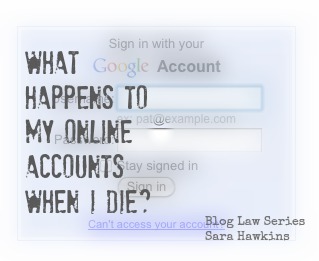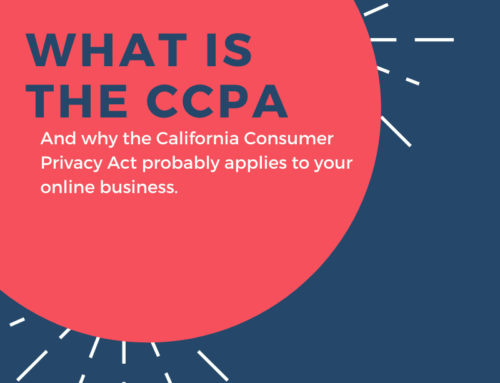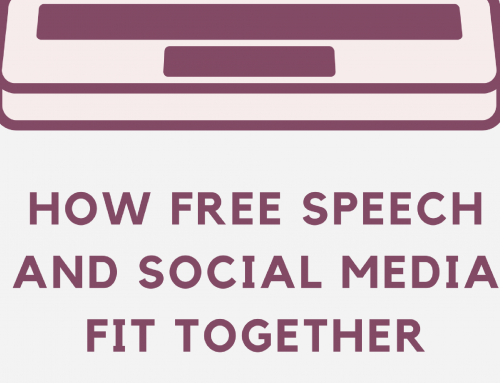
What happens to our social media and online accounts after death?
I know, kind of a morbid topic. But last week CycleGuy found out on Facebook that one of his friends from high school had passed away. A guy he had talked to on Facebook chat just a week or so prior. A 40-something year young father, leaving behind his wife and their beautiful children.
And now, in addition to all the details that must be dealt with upon the death of a spouse there is an added dimension. What to do about all those accounts we have on the internet? Logins, passwords, security questions, and who knows what all else for security these days.
Digital Assets are becoming a very important part of our lives. No longer do we have that old A-Z phone book from the corner drug store that our parents and grandparents had. In its place we have multiple username and password combinations for places such as Facebook, Twitter, Amazon, Gmail, Yahoo, many retailers, online games, financial institutions and so much more.
I got to talking to CycleGuy about how he found out and does the friend’s Facebook account still exist and a whole host of other topics. Part of it is the lawyer in me. And part of it is because I’m so keenly aware of the growing list that I have taped to the wall with all my login information. Super secure, I know!
What would happen if your spouse needed to gain access to your online life? I’m not talking about searching for clandestine rendezvous information. I’m talking about what if you were hospitalized and the mortgage needed to be paid or the credit card bill was due. Or your email(s) went unchecked.
A few years ago I read about an online company called Legacy Locker which was started by a guy because his grandmother died and the family had no way of accessing her online life. The company charges a fee to put all your digital asset information in one place. I’ve never used them, nor have I investigated them to determine their full value.
What I do know is that Gmail has a process in place to report and gain access to email accounts for deceased persons. I’m sure that policy would apply if you were dealing with a situation of being appointed guardian or conservator in the case of incapacitation.
Facebook has a policy relating to accounts for the deceased. You actually have a choice. You can report a deceased person’s Facebook profile so you can gain access to it and keep it active. There is also an option to remove the Facebook profile of a deceased person. People have different reasons for maintaining or removing the profile, so it’s nice to see that Facebook has addressed both situations. Again, though, there is no clear information regarding the gaining of access by guardians or what to do in cases of incapacitation.
Twitter also has a written policy about what to do about a deceased Twitter user. As with the prior digital assets mentioned, there does not appear to be a form for the situation involving an incapacitated user. I’m pretty sure, though, that even though there is not a specified form that Twitter would engage in discussions to ensure access in such cases.
Yahoo accounts have no right of survivorship. This means that no one gets access to a deceased person’s account. This can pose significant issues if the email holds key pieces of information to handling the affairs properly.
It does not appear that Amazon follows a standardized policy regarding the accounts of the deceased or incapacitated, so you would likely need to call directly. Keep in mind that they will not likely give you access, cancel orders or delete an account based on a single phone call. Additional documentation will likely need to be provided so be prepared.
As for Paypal, only the user can close an account. Special procedures are in place to close an account for the deceased. To close the account for a deceased Paypal user, the executor need to contact Paypal directly. Funds are released only upon verification of necessary information.
As you can see, your Digital Assets are not as easily and readily taken care of as your physical assets. There is no fancy will that dictates what to do nor is there some single source document that we all leave and create via an attorney with our estate plan. Leaving a list of all the digital assets we possess seems counter-intuitive to everything we know about having all our login and password information in one place.
It might now be time to create the Digital Estate Plan so that should something happen others would be able to gain access to much needed information. This is especially the case where one person is responsible for the money management. It is also important that parents of adult children know how to handle their children’s accounts. For many young people they may not even realize the extent to which their parents are digitally connected.
An open conversation and thoughtfully prepared documents can help alleviate a lot of stress and work at a time of grieving or challenge. As a lawyer, it’s interesting to me to see how much succession and end of life planning has been impacted by changes in technology. Nonetheless, at least I have my jumbled excel spreadsheet taped to the wall for all to see. Not the best, but at least it’s a start!
Do you have a Digital Estate Plan? Would your family know how to access your Digital Assets should an emergency arise?






when i make a will – which i still haven’t done even though i know i really should – it will have all my important financial/business related online account info in it.
right now i have a big passwords lists which info about what the different accounts are for within my google account so if i died my family could gain access to it.
basically i have plans to set up something more formal and organized but it’s not something i’ve gotten around to doing
Morbid or not, great post! I love the way your brain thinks. My Grandmother’s deceased profile is still on Facebook, and it’s nice to sometimes see her smiling face out of the blue as a constant reminder of her spirit. Hmmm, the things we never think about.
Wow, I haven’t thought of this before but it makes sense. Perhaps a list of passwords and accounts in the bank safe deposit box. I think that’s what I’m going to do. Thanks for making me think about this…
What a great article. I can honestly say that I have never thought about that!
Thanks, Sara 🙂
Excellent post!!! I think this is an interesting idea. Why don’t you start a digital estate planning guide?! OMG that would be aweseome!!!
I have my pw info in a secret place… which means no one will find it unless they rummage trough all my stuff. LOL but it IS taped somewhere.
This is definitely something to think about!!!
Best,
Li
@LaLicenciada
This is a great post! Definitely important to think about. Thanks for sharing all that info!
I just stumbled it! 🙂
Fascinating topic. I assume there’s no one who’s marketing such an estate plan? Could be your million dollar idea, love!
I think my brother is computer savvy enough to handle my online life affairs if something were to happen to me, and I think he knows where I keep all my passwords. But we plan to work on our wills this month (as two single people with no other beneficiaries, it just seems like the thing to do) so I’m going to add this to the process for both of us.
If you have any insights on how to go about doing that, apart from taping something to the wall 🙂 I hope you’ll do a follow-up post!
If a user does not access their yahoo account for three or more months, then _all_ emails in the account are lost (deleted). Membership of Yahoogroups remains intact. This would seem to negate the need for a deceased statement of intent.
In Europe legislation is being drafted for a person to be ‘forgotten’ – when a person un-subscribes from an email or social site, (the example given in the news article was Facebook) a person closing their account can insist that no information be retained by the website – in essence, the person is ‘forgotten’.
Another thing to consider is that certain online accounts have an inactivity closure policy. Which means if the survivor doesn’t act fast the account could be deleted based on inactivity. Thanks for the info!
[…] What Happens To All My Online Accounts When I Die? @Saving for Someday […]
One online company which claims to have a solution to accessing the passwords of deceased people is Death Switch ). They will contact you at agreed intervals, and if no response, send info to a nominated party. Of course, if Death Switch itself goes out of business, then beneficiaries are zapped too … and we don’t really know who runs the company. This whole issue seems like a service that could be usefully, cheaply and securely provided to most citizens by the government registrar of births, deaths & marriages. Of course, the lawyers would object about losing business…
You might be interested in http://www.lifeensured.com. It’s an online service that helps people to organize their online lives before they pass away – an answer to the need for a digital estate plan. You can use it to locate all your accounts in one place, assign beneficiaries and leave instructions. You can outline your wishes for almost any social media or online account e.g. Facebook, Twitter, PayPal, Ebay and can get quite specific about what gets closed, kept and transferred to family and friends. There is also an option to prepare final blog posts, tweets etc. that will be posted after your death is confirmed.
Government should manage this and charge a fee to the estate. All utilities should be notified and they could agree a tailing off off the services. All monies that you own in banks and stocks would be easily liberated if government has directed that all these accounts must be registered for your benefit, with government. Untold billions of financial assets are lost because nobody knows about them. This is idiocy. Let us have a system.